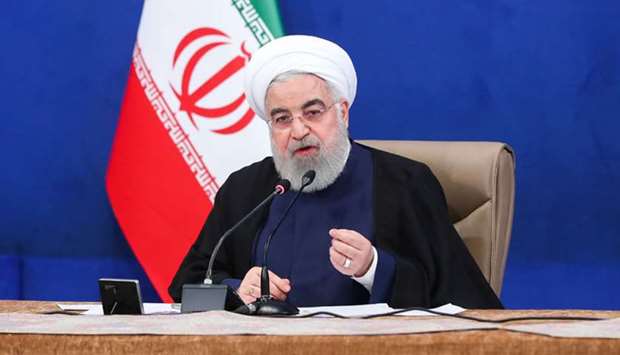Iran reopened for business despite its persistent coronavirus outbreak as there was no end in sight to the crisis, its president said yesterday, as 80 new deaths were announced.
“Due to uncertainty about when this virus will end, we are preparing for work, activity and science,” said President Hassan Rouhani.
“We have to follow all the medical instructions, but work and production are as essential as these precautions,” he told a televised cabinet meeting.
His remarks came as the health ministry announced that 80 new deaths from the novel coronavirus had taken the country’s overall toll to 5,957.
Ministry spokesman Kianoush Jahanpour said another 1,073 people tested positive for the virus in the past 24 hours.
All but 20,000 of the 93,657 people who contracted the illness since mid-February have been discharged from hospital, he told a televised news conference.
Iran has struggled to contain the coronavirus outbreak since reporting its first cases — two deaths in the holy city of Qom — on February 19.
Despite still battling the virus, the government has allowed many businesses to reopen since April 11 after shutting most down in mid-March to stem the spread of the disease.
Rouhani yesterday also told the United States it “should not plot against the Iranian nation every day”, amid fresh tensions between the two nations.
Tehran and Washington have traded barbs over a spate of incidents in the past year involving their forces in the sensitive waters of the Gulf.
Their latest high-seas confrontation came on April 15, when the United States said 11 Iranian boats harassed its navy ships in what it described as the international waters of the “Arabian Gulf”.
President Donald Trump then tweeted that he had ordered the US Navy to “shoot down and destroy any and all Iranian gunboats if they harass our ships at sea”.
Iran’s president yesterday replied: “They should not plot against the Iranian nation every day. The soldiers of our armed forces in the guardians of the Revolution, the army, Basij (paramilitary organisation) and the police have always been and will be the guardians of the Gulf.”
Tensions between them have escalated since 2018 when Trump unilaterally withdrew the US from a multinational accord that froze Iran’s nuclear programme and reimposed crippling sanctions on its economy.
The nations have appeared to come close to a direct military confrontation twice since June last year, when Iran shot down a US drone in the Gulf.
On that occasion, Trump cancelled retaliatory air strikes at the last minute. Trump also opted not to take any military action in January after Iran fired a barrage of missiles at US troops stationed in Iraq. Iran launched the missiles after a US drone strike near Baghdad airport killed Qasem Soleimani, the general who headed the Revolutionary Guards’ foreign operations arm, the Quds Force.
Iran must not give in to US “provocations”, Russia said yesterday, following months of mounting tension between Washington and Tehran.
“We are urging maximum restraint and caution, not to give in to provocations and aggressive rhetoric,” foreign ministry spokeswoman Maria Zakharova told reporters.
Zakharova stressed that both countries should act in “strict accordance with international norms and regulations.” “Moscow has always considered stability and security in the Gulf to be a key factor that influences the situation in the wider regional context,” she added.

A handout picture provided by the Iranian presidency yesterday, shows President Hassan Rouhani chairing a cabinet session in the capital Tehran.
